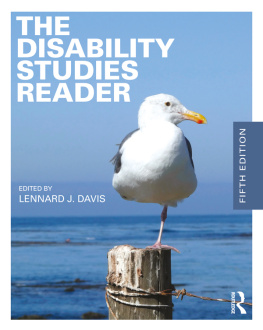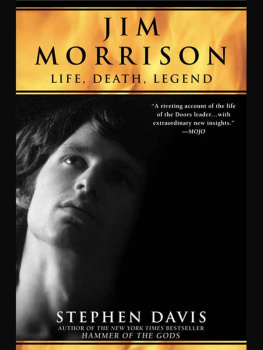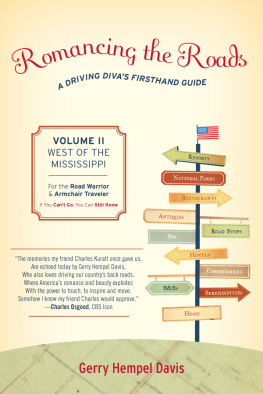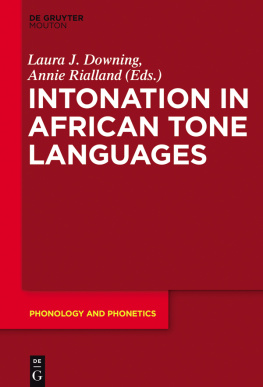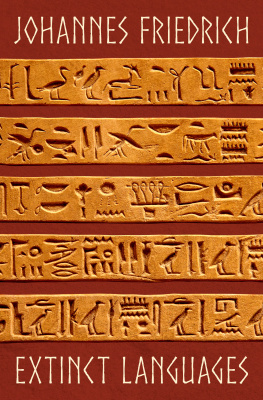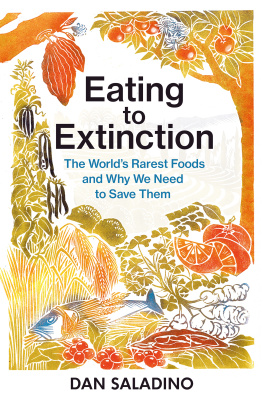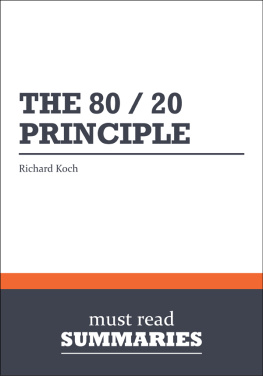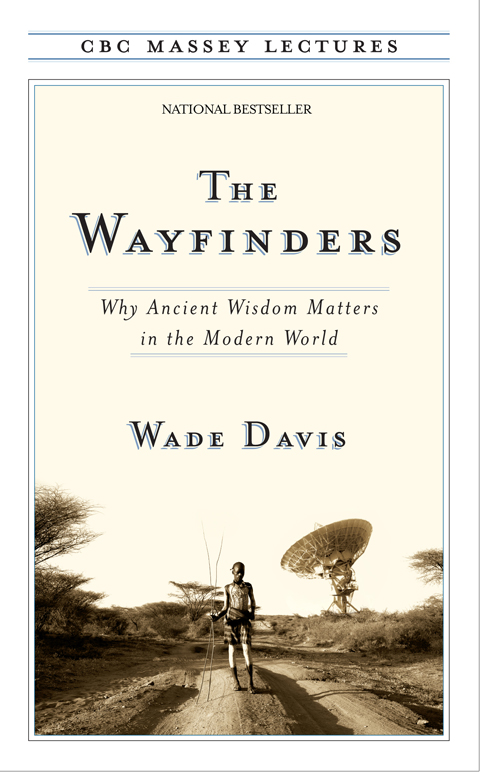THE MASSEY LECTURE SERIES
The Massey Lectures are co-sponsored by CBC Radio, House of Anansi Press, and Massey College in the University of Toronto. The series was created in honour of the Right Honourable Vincent Massey, former Governor General of Canada, and was inaugurated in 1961 to provide a forum on radio where major contemporary thinkers could address important issues of our time.
This book comprises the 2009 Massey Lectures, The Wayfinders, broadcast in November 2009 as part of CBC Radios Ideas series. The producer of the series was Philip Coulter; the executive producer was Bernie Lucht.
WADE DAVIS
Wade Davis is the best-selling author of several books, including The Serpent and the Rainbow, Light at the Edge of the World, One River, and The Clouded Leopard. He is an award-winning anthropologist, ethnobotanist, filmmaker, and photographer, and his writing and photographs have appeared in numerous publications, including the Globe and Mail, Macleans, Newsweek, National Geographic, the Wall Street Journal, and the Washington Post. He currently holds the post of Explorer-in-Residence at the National Geographic Society in Washington, D.C., and divides his time between that city and northern British Columbia.
Copyright 2009 Wade Davis
All rights reserved. No part of this publication may be
reproduced or transmitted in any form or by any means,
electronic or mechanical, including photocopying, recording,
or any information storage and retrieval system, without
permission in writing from the publisher.
Distribution of this electronic edition via the Internet or
any other means without the permission of the publisher is
illegal. Please do not participate in electronic piracy of
copyrighted material; purchase only authorized electronic
editions. We appreciate your support of the authors rights.
This edition published in 2009 by
House of Anansi Press Inc.
110 Spadina Avenue, Suite 801
Toronto, ON, M5V 2K4
Tel. 416-363-4343
Fax 416-363-1017
www.anansi.ca
Library and Archives Canada Cataloguing in Publication
Davis, Wade
The wayfinders : why ancient wisdom matters in the modern world / Wade Davis.
(CBC Massey lecture series)
eISBN 978-0-88784-969-5
1. Acculturation. 2. Language and culture. 3. Endangered languages.
4. Indigenous peoples Languages. I. Title. II. Series: CBC Massey lecture series
GN366.W33 2009 303.482 C2009-903511-1
Cover design: Bill Douglas at The Bang

We acknowledge for their financial support of our publishing program the Canada Council for the Arts, the Ontario Arts Council, and the Government of Canada through the Canada Book Fund.
For David Maybury-Lewis
19292007
One
SEASON OF THE BROWN HYENA
I want all the cultures of all lands to be blownabout my house as freely as possible. But I refuse to be blown off my feetby any. Mahatma Gandhi
ONE OF THE INTENSE pleasures of travel is the opportunity to liveamongst peoples who have not forgotten the old ways, who still feel theirpast in the wind, touch it in stones polished by rain, taste it in thebitter leaves of plants. Just to know that, in the Amazon, Jaguar shamanstill journey beyond the Milky Way, that the myths of the Inuit elders stillresonate with meaning, that the Buddhists in Tibet still pursue the breathof the Dharma is to remember the central revelation of anthropology: theidea that the social world in which we live does not exist in some absolutesense, but rather is simply one model of reality, the consequence of one setof intellectual and spiritual choices that our particular cultural lineagemade, however successfully, many generations ago.
But whether we travel with the nomadic Penan inthe forests of Borneo, a Vodoun acolyte in Haiti, a curandero in the high Andes of Peru, a Tamashek caravanseri in the red sands of the Sahara, or a yak herderon the slopes of Chomolungma, all these peoples teach us that there areother options, other possibilities, other ways of thinking and interactingwith the earth. This is an idea that can only fill us with hope.
Together the myriad of cultures makes up anintellectual and spiritual web of life that envelops the planet and is everybit as important to the well being of the planet as is the biological web oflife that we know as the biosphere. You might think of this social web oflife as an ethnosphere, a term perhaps best defined as the sumtotal of all thoughts and intuitions, myths and beliefs, ideas andinspirations brought into being by the human imagination since the dawn ofconsciousness. The ethnosphere is humanitys greatest legacy. It is theproduct of our dreams, the embodiment of our hopes, the symbol of all we areand all that we, as a wildly inquisitive and astonishingly adaptive species,have created.
And just as the biosphere, the biological matrixof life, is being severely eroded by the destruction of habitat and theresultant loss of plant and animal species, so too is the ethnosphere, onlyat a far greater rate. No biologist, for example, would suggest that 50percent of all species are moribund. Yet this, the most apocalyptic scenarioin the realm of biological diversity, scarcely approaches what we know to bethe most optimistic scenario in the realm of cultural diversity.
The key indicator, the canary in the coal mine ifyou will, is language loss. A language, of course, is not merely a set ofgrammatical rules or a vocabulary. It is a flash of the human spirit, thevehicle by which the soul of each particular culture comes into the materialworld. Every language is an old-growth forest of the mind, a watershed ofthought, an ecosystem of spiritual possibilities.
Of the 7,000 languages spoken today, fully halfare not being taught to children. Effectively, unless something changes,they will disappear within our lifetimes. Half of the languages of the worldare teetering on the brink of extinction. Just think about it. What could bemore lonely than to be enveloped in silence, to be the last of your peopleto speak your native tongue, to have no way to pass on the wisdom of yourancestors or anticipate the promise of your descendants. This tragic fate isindeed the plight of someone somewhere on earth roughly every two weeks. Onaverage, every fortnight an elder dies and carries with him or her into thegrave the last syllables of an ancient tongue. What this really means isthat within a generation or two, we will be witnessing the loss of fullyhalf of humanitys social, cultural and intellectual legacy. This is thehidden backdrop of our age.
There are those who quite innocently ask,Wouldnt the world be a better place if we all spoke the same language?Would not communication be facilitated, making it easier for us to getalong? My answer is always to say, A wonderful idea, but lets make thatuniversal language Haida or Yoruba, Lakota, Inuktitut or San. Suddenlypeople get a sense of what it would mean to be unable to speak their mothertongue. I cannot imagine a world in which I could not speak English, for notonly is it a beautiful language, its my language, the full expression ofwho I am. But at the same time I dont want it to sweep away the othervoices of humanity, the other languages of the world, like some kind ofcultural nerve gas.
Languages, of course, have come and gone throughhistory. Babylonian is no longer spoken in the streets of Baghdad, or Latinin the hills of Italy. But again the biological analogy is useful.Extinction is a natural phenomenon, but in general, speciation, theevolution of new forms of life, has outpaced loss over the last 600 millionyears, making the world an ever more diverse place. When the sounds of Latinfaded from Rome, they found new expression in the Romance languages. Today,just as plants and animals are disappearing in what biologists recognize asan unprecedented wave of extinction, so too languages are dying at such arate that they leave in their wake no descendants.


